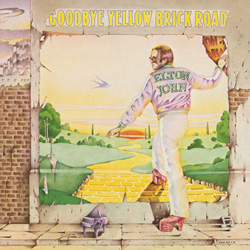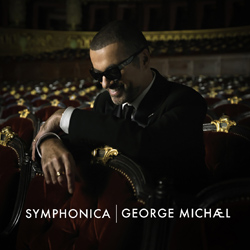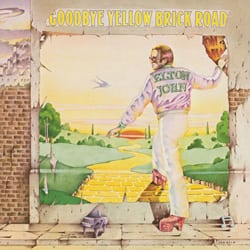It’s the old and the new in music this week.
 First the old: Sir Elton John wasn’t officially out (neither was he a “sir” yet) when he released his two-LP milestone recording Goodbye Yellow Brick Road in 1973. Newly reissued by Mercury/UMe/Rocket in an expanded 40th anniversary deluxe edition, GYBR was the most glam album of his career to that point, a style he would continue to explore on a few more albums. “Glam” didn’t necessarily mean “gay,” but Goodbye Yellow Brick Road was also his gayest album until then. The titular reference aside (we know Elton was a Friend of Dorothy now), EJ heaped on the hints in songs such as the Marilyn Monroe memorial “Candle In The Wind,” as well as “All The Young Girls Love Alice” and the sexual ambiguity of “Bennie and the Jets.”
First the old: Sir Elton John wasn’t officially out (neither was he a “sir” yet) when he released his two-LP milestone recording Goodbye Yellow Brick Road in 1973. Newly reissued by Mercury/UMe/Rocket in an expanded 40th anniversary deluxe edition, GYBR was the most glam album of his career to that point, a style he would continue to explore on a few more albums. “Glam” didn’t necessarily mean “gay,” but Goodbye Yellow Brick Road was also his gayest album until then. The titular reference aside (we know Elton was a Friend of Dorothy now), EJ heaped on the hints in songs such as the Marilyn Monroe memorial “Candle In The Wind,” as well as “All The Young Girls Love Alice” and the sexual ambiguity of “Bennie and the Jets.”
A source for several hit singles in addition to songs that would become instant classics, GYBR kicked off Elton’s musical reign, which would last throughout the 1970s and ’80s. The deluxe edition includes one remastered disc with all 17 songs from the original. The second disc features nine songs, “highlights” from the December 1973 Hammersmith Odeon concert. The remaining nine songs on the second disc fall under the Goodbye Yellow Brick Road Revisited heading. An odd assortment of artists including Fall Out Boy, Emeli Sande, Miguel and The Band Perry, all try their hands at interpreting Sir Elton. Thankfully, someone thought to include John Grant, an openly gay artist, among the performers. As it turns out, his rendition of “Sweet Painted Lady” is the best of the cover versions.
In 1973, while Elton was still technically in the closet, Patrick Haggerty of Lavender Country was kicking down the door in glittering cowboy boots. Long before the existence of the queer music scene led by the riot grrrls in the ’90s, the Pacific Northwest-based Haggerty’s band independently released its self-titled album. The second CD reissue of this landmark recording (the first was in 1999), Lavender Country (Paradise of Bachelors) commemorates the 40th anniversary release in a deluxe edition that includes booklet containing an oral history, along with previously unpublished photos (the vinyl version includes a download code). Song titles such as “Come Out Singing,” “Back In the Closet Again,” “Cryin’ These Cocksucking Tears” and “Lavender Country” paint a picture of what you can expect. But what is probably the most amazing thing is the combination of queer themes with authentically crafted country music of the time (which sounds vastly different from 21st century country). With attitudes changing at varying paces, and queer artists, such as Brandy Clark coming out of the country closet, Lavender Country’s time may have finally come, 40 years later.
Now on to the new: What do you do after founding and playing in one of the most influential (and loudest) band’s in the history of college/alternative/modern rock? If you’re Bob Mould, formerly of Husker Du, you release a solo album, Workbook, which ranks with the best work you did with your former band-mates. The expanded, double disc reissue Workbook 25 (Omnivore) — yes, it’s really been 25 years — features the remastered original album plus the bonus track “All Those People Know” on the breathtaking first disc, which shows that Mould can unplug with the best of them. Songs such as “See A Little Light,” “Poison Years” and “Whichever Way The Wind Blows,” were instant classics. The second disc, recorded live at Chicago’s Cabaret Metro (now known simply as Metro) in 1989, includes songs from Workbook, as well as a cover of Richard Thompson’s “Shoot Out The Lights,” and Husker Du tunes “Hardly Getting Over It,” “Celebrated Summer” and “Makes No Sense At All.”
 George Michael waited a few years before putting out his second solo album. That’s probably because Faith, his multi-platinum first solo disc, was such a great source for hit single after hit single, any follow-up would pale. By the time Listen Without Prejudice hit shelves in the summer of 1990, Michael was beginning to withdraw from the limelight. Back then, speculation about his sexuality was still a subject for debate (although his LGBT fans had a pretty good idea on whose team he played). He finally did come out, in a rather ungraceful manner following a public sex bust, and since then has been a visible presence in the community.
George Michael waited a few years before putting out his second solo album. That’s probably because Faith, his multi-platinum first solo disc, was such a great source for hit single after hit single, any follow-up would pale. By the time Listen Without Prejudice hit shelves in the summer of 1990, Michael was beginning to withdraw from the limelight. Back then, speculation about his sexuality was still a subject for debate (although his LGBT fans had a pretty good idea on whose team he played). He finally did come out, in a rather ungraceful manner following a public sex bust, and since then has been a visible presence in the community.
Michael’s new live album Symphonica (Island), recorded with a symphony orchestra, draws on his personal songbook, including “Praying For Time,” “A Different Corner,” “One More Try” and “Cowboys and Angels.” There are also inspired covers of songs by Terence Trent D’Arby (“Let Her Down Easy”), Ewan MacColl (“The First Time Ever I Saw Your Face”), Anthony Newley and Leslie Bricusse (“Feeling Good”) and Elton John (“Idol”). All in all, it’s good to hear Michael’s voice again (especially in a year that also brought us Boy George’s first new solo studio album in 20 years) and perhaps we will hear from him again before long.
Would there be a Rufus Wainwright without Elton John or George Michael? He certainly would be making music — his family tree, including his late mother Kate McGarrigle and his father Loudon Wainwright III, as well as aunts Anna McGarrigle and Sloan Wainwright, would be a good indication of that. But Rufus, who has long been one of the most open and out artists, surely benefited from the groundwork laid by his queer forebears.
 The double disc deluxe edition of Vibrate: The Best of Rufus Wainwright (Interscope/Geffen/Decca/UMe) consists of 34 tracks, selected by Wainwright himself, covering the period beginning with his 1998 eponymous debut through 2012’s Out of the Game (although it excludes 2010’s All Days Are Nights: Songs For Lulu). There are also two new songs, including the marvelous “Me and Liza,” as well as a healthy portion of live recordings. Of course, Wainwright’s legendary recording of Leonard Cohen’s “Hallelujah” is present, but “Gay Messiah” is absent. If you can’t get enough of Rufus in a live setting, the Live From the Artists Den (UMe/Artists Den) album (and separate DVD) will satisfy that craving.
The double disc deluxe edition of Vibrate: The Best of Rufus Wainwright (Interscope/Geffen/Decca/UMe) consists of 34 tracks, selected by Wainwright himself, covering the period beginning with his 1998 eponymous debut through 2012’s Out of the Game (although it excludes 2010’s All Days Are Nights: Songs For Lulu). There are also two new songs, including the marvelous “Me and Liza,” as well as a healthy portion of live recordings. Of course, Wainwright’s legendary recording of Leonard Cohen’s “Hallelujah” is present, but “Gay Messiah” is absent. If you can’t get enough of Rufus in a live setting, the Live From the Artists Den (UMe/Artists Den) album (and separate DVD) will satisfy that craving.
The trans community got a boost when the former Tom Gabel of respected Florida punk band Against Me! not only transitioned genders to become Laura Jane Grace, but also released Transgender Dysphoria Blues (Total Treble) the most powerful album on the issue since Namoli Brennet’s Boy In A Dress or the cast recording of Hedwig and the Angry Inch. The album-opening title cut and “True Trans Soul Rebel” both have the making of anthems. In fact, when Grace stays on topic, on brilliant numbers such as “Unconditional Love,” “Drinking With The Jocks,” “Fuck My Life 666,” “Dead Friend,” “Paralytic States,” “Black Me Out” and the breathtaking acoustic track “Two Coffins,” Transgender Dysphoria Blues is a masterpiece, an essential life lesson for all members of society. — Gregg Shapiro












